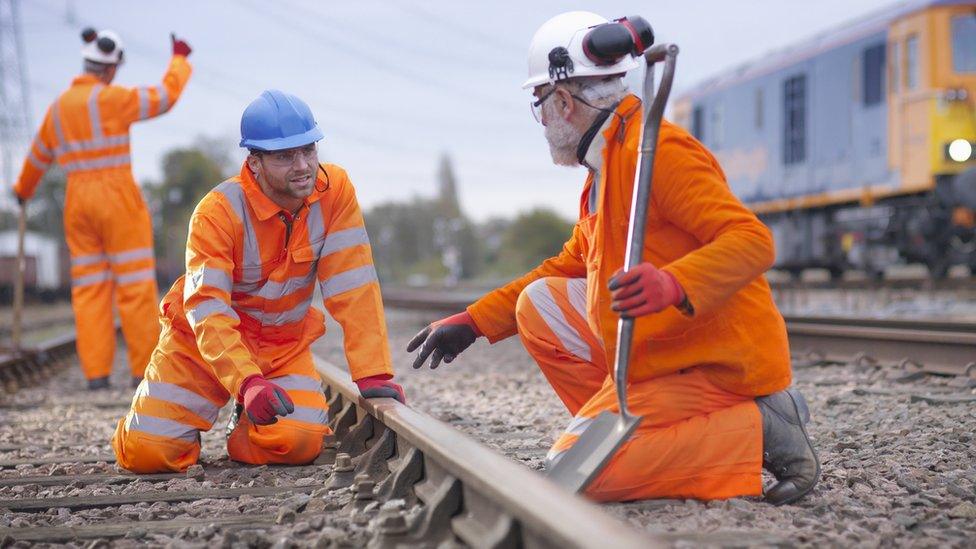Rail strike threat over pay not unreasonable, says union
- Published
- comments
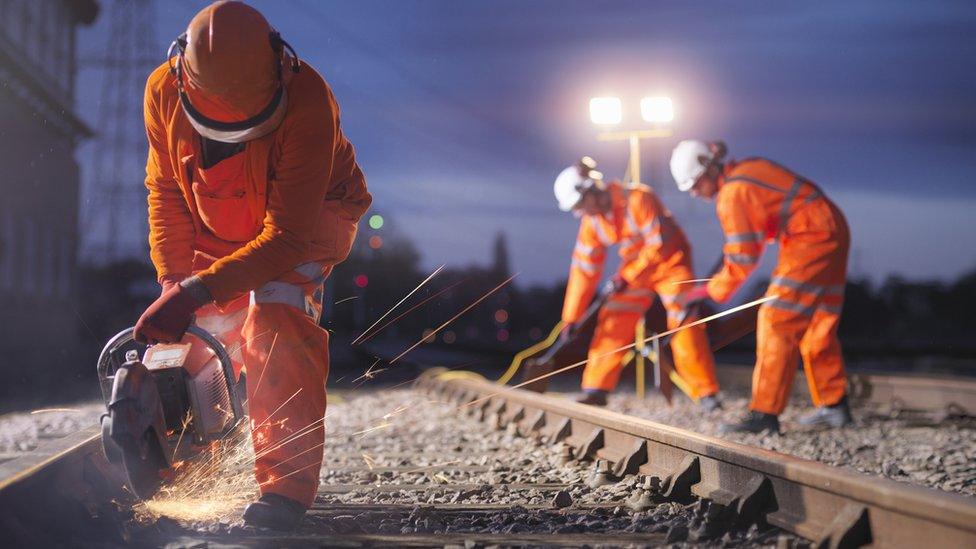
A rail workers' union has said its demands for a pay rise are "not unreasonable", after its members voted to hold a national strike.
The RMT Union said some railway workers have had their pay frozen for three years.
On Tuesday, RMT members at track operator Network Rail and 13 train operating firms voted overwhelmingly in favour of strike action.
The Department for Transport said strikes should be the last resort.
A spokesperson said: "It is hugely disappointing and premature that the RMT is calling for industrial action before even entering discussions."
The prospect of a national strike threatens major summer travel disruption across the UK.
Eddie Dempsey, assistant general secretary at RMT, told the BBC that some of their members "are in the third year of a pay freeze this year".
"Don't forget we kept this country moving during the pandemic, we've tightened our belts, we haven't had a pay rise. At the same time, the private companies made bumper profits," he said.
Mr Dempsey said the union is calling for a pay rise, job security and no compulsory redundancies.
"That's not unreasonable in the current day and age is it," he said.
Tony Miles, a writer for Modern Railways magazine, told the BBC that there may be some public sympathy for RMT members if no pay rise is offered, especially given the cost of living crisis.
But he warned that sympathy might have limits.
"If the RMT's members are offered something that sounds acceptable, and they end up holding out a lot longer, I think that won't play well with the public, especially when you consider there will be passengers who haven't also hadn't had pay increases or are also struggling to pay bills," he said.
"If it looks like unions are trying to hold country to ransom, public mood might turn sour very quickly."
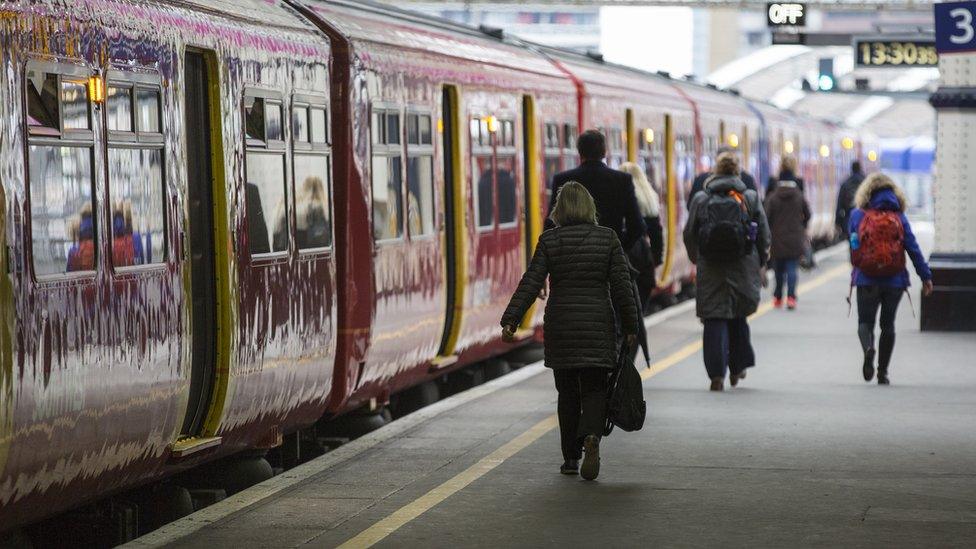
National strike action could cause widespread travel disruption over the summer
The strike ballot of National Union of Rail, Maritime and Transport Workers saw 89% vote in favour of a strike and 11% against. Some 71% of RMT's 40,000 members voted.
Workers at Network Rail, which maintains the UK's railway infrastructure, have not taken part in a national strike since 1994.
The union said the company planned to shed 2,500 maintenance jobs as it tried to make £2bn of savings over the next two years.
The RMT union has said its leaders will meet to discuss a timetable for strike action from mid-June.
Mr Dempsey said he hoped a deal could still be reached, adding that the union "urgently" needed to sit down with industry and with the government.
"The quicker we do that, the quicker we can get a settlement, and hopefully we won't have to take the next step of announcing strike action."
The Department for Transport said the railways were "still on life support" and warned that anything that drives more passengers away "risks killing services and jobs".
A spokesperson said: "We urge the RMT to reconsider and accept the invitation of industry talks, so we can find a solution that delivers for workers, passengers and taxpayers alike."
Disruption warnings
If Network Rail staff, which include signallers, walk out, it will affect both passenger services and the movement of goods by train, including bulk consignments of fuel and some food, experts say.
Trains might only run for part of the day, such as from 07:00 to 19:00 BST and only on main lines. Services could also be reduced to around a fifth of the normal weekday timetable, they add.
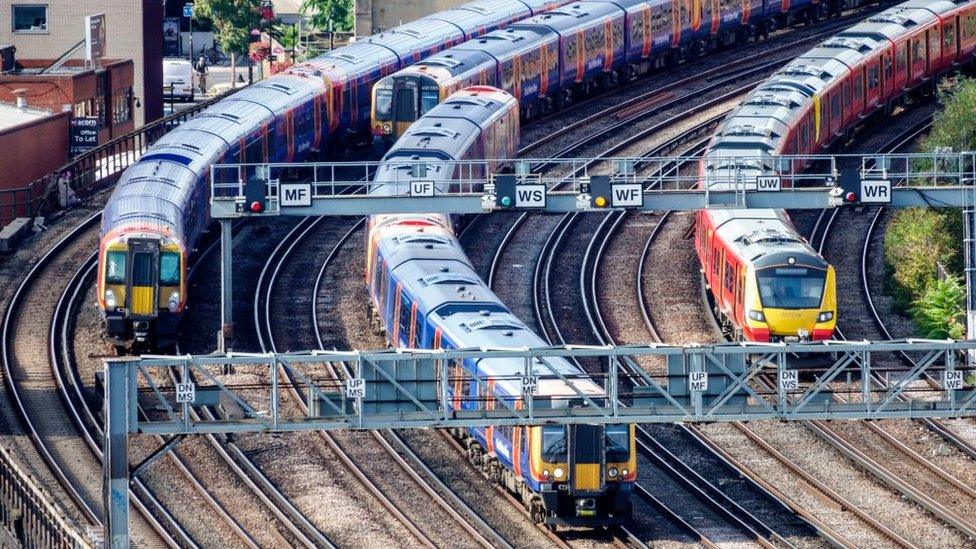
There are warnings that any potential strikes could have a major impact on rail freight and the sector's ability to move goods around the UK.
John Smith, chief executive of GB Railfreight, said if the disruption ends up being long term, the effects would be "dramatic".
"It will crystallise in various ways, whether it be shortage of fuel at the pumps, whether it be production being stopped in factories of cars, whether it be electricity generation or Drax having to switch off and not being able to generate electricity," he said.
Trade body UKHospitality has also warned that a national rail strike could jeopardise the hospitality industry's recovery from the pandemic.
Its chief executive Kate Nicholls said: Strikes would inevitably damage our already fragile hospitality businesses, which would have a negative knock-on effect to the wider UK economy."
She added: "A lack of commuter trains bringing people into towns and cities will further set back the recovery of our high streets and will also deter people from going out in the evening - especially women and vulnerable people who may rely on trains to get them home and feel safe late at night."
Related topics
- Published24 May 2022
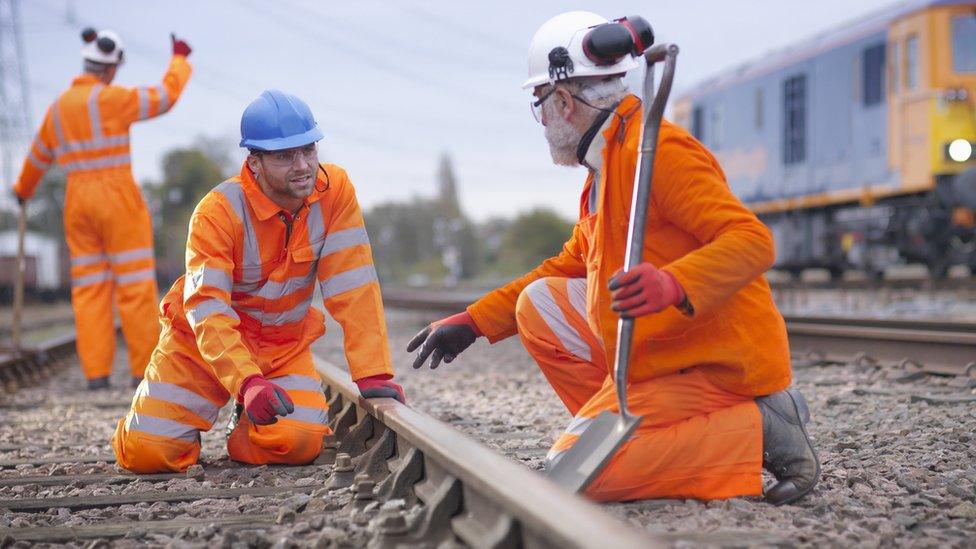
- Published20 April 2022
